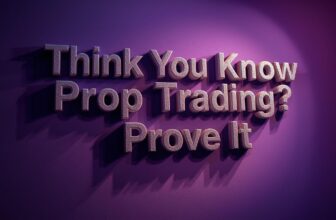
One of the most significant developments in the financial industry has been the rise of proprietary trading firms, or “prop firms” as they’re commonly known. These unique financial institutions have democratized access to capital and transformed how retail traders can participate in financial markets. In this comprehensive guide, I’ll break down what is prop trading firm, how they operate, and why they’ve become such a pivotal part of the modern trading landscape.
Understanding What is Prop Trading Firm
A proprietary trading firm (prop firm) is a company that trades financial instruments using its own capital rather than client funds. The primary goal is to generate profits through various trading strategies across multiple markets – including forex, futures, cryptocurrencies, and stocks.
Think of a prop trading firm like a professional sports team that scouts talented players, provides them with resources and coaching, and then profits from their performance. The key difference here is that instead of athletes, prop firms recruit skilled traders who can generate consistent returns in financial markets.
Traditional vs. Modern Prop Trading Firms
Prop trading firms have evolved significantly over the years:
- Traditional Prop Firms: Physical offices where traders work side-by-side, often with profit-sharing models or trading firm’s capital only
- Modern Remote Prop Firms: Online-based operations that fund traders after they pass evaluation programs, allowing traders to work from anywhere in the world
- Hybrid Models: Firms that combine elements of both approaches, offering both in-house and remote trading opportunities
How Prop Trading Firms Operate
Understanding what is prop trading firm requires examining their business model. Most modern prop firms operate on a “funded trader” model that follows a specific framework:
The Evaluation Process
Before giving you access to their capital, prop firms need to verify your trading capabilities. This typically involves:
- Challenge/Evaluation Account: A simulated or funded account with specific rules and profit targets
- Trading Guidelines: Maximum drawdown limits, minimum trading days, profit targets, and risk management parameters
- Time Constraints: Usually 30-60 days to demonstrate consistent profitability
For example, a typical evaluation might require you to achieve a 10% profit while maintaining a maximum drawdown of 5% over 30 trading days. This structure is designed to identify disciplined traders who can generate returns while managing risk effectively.
The Most Recommended Firms – Click Here to Unlock Your Earning Potential
Profit-Splitting Model
Once you’ve passed the evaluation, prop firms typically offer a profit-split arrangement:
- Typical Splits: 70/30, 80/20, or even 90/10 (trader/firm)
- Account Scaling: Opportunities to manage increasingly larger capital amounts as you demonstrate success
- Payout Schedules: Usually monthly or bi-monthly profit distributions
In my experience, a skilled trader managing a $100,000 account with an 80/20 split who generates a 5% monthly return could earn $4,000 monthly ($100,000 × 5% × 80%), while the firm keeps $1,000.
What is Prop Trading Firm
What is Prop Trading Firm
Why is What is Prop Trading Firm Important in Today’s Market
Prop trading firms have revolutionized the financial industry by solving several critical problems for retail traders:
Capital Access
The most significant barrier to trading success is often insufficient capital. What is prop trading firm important for? Primarily democratizing access to trading capital:
- Turn $500-$1,000 (evaluation fee) into access to $100,000+ in trading capital
- Scale to managing millions without needing to personally accumulate that capital
- Focus on percentage returns rather than absolute dollar amounts
Risk Management Structure
Prop firms enforce disciplined trading through:
- Strict drawdown limits that prevent catastrophic losses
- Required risk management protocols that build good habits
- Performance metrics that encourage consistency over gambling
This structure has been transformative for many traders I’ve mentored. One trader who consistently blew accounts trading independently thrived under the structured environment of a prop firm, growing from a $25,000 account to managing $500,000 within 18 months.
Types of Prop Trading Firms
When researching what is prop trading firm options, you’ll encounter several business models:
Challenge-Based Prop Firms
The most common model for retail traders:
- One-time or subscription fee to attempt challenges
- Two-phase evaluation (challenge → verification)
- Examples: FTMO, The Funded Trader, My Forex Funds
Subscription-Based Prop Firms
Ongoing monthly fee model:
- Regular payments to maintain funded account access
- Often lower entry barriers but smaller profit splits
- Examples: Topstep, Earn2Trade
How to Select the Right Prop Trading Firm
Understanding what is prop trading firm isn’t enough – you need to choose the right one for your trading style:
Key Evaluation Criteria
- Reputation and Longevity: How long has the firm been operating? Do they have a track record of paying traders?
- Rules and Restrictions: Are the trading parameters realistic for your strategy?
- Available Markets: Do they support the instruments you trade (forex, futures, stocks)?
- Scaling Opportunities: Can you grow your capital allocation over time?
- Fee Structure: Is the evaluation fee reasonable compared to the potential returns?
In my career, I’ve seen countless traders fail by choosing firms with unrealistic evaluation parameters or restrictive trading rules that clash with their strategies. Always ensure the firm’s model aligns with your trading approach.
Common Questions About What is Prop Trading Firm
What is the difference between a prop trading firm and a hedge fund?
While both manage capital for profit, they differ fundamentally:
- Prop Trading Firm: Trades only company capital, often giving traders access to leverage with profit-sharing arrangements
- Hedge Fund: Primarily manages external investor money, charging management fees (typically 2%) and performance fees (typically 20%)
How much can I earn with a prop trading firm?
Earnings depend on several factors:
- Account size (ranging from $10,000 to $1,000,000+)
- Your consistent return percentage (realistic is 5-15% monthly)
- Profit split arrangement (typically 70-90% to the trader)
For perspective, a trader managing a $100,000 account who consistently generates 8% monthly with an 80% profit split could earn $6,400 monthly or $76,800 annually.
Are prop trading firms legitimate?
While many reputable prop firms exist, due diligence is essential:
- Research trader reviews and payment proof
- Verify regulatory compliance where applicable
- Look for transparent communication and clear terms
- Beware of firms with unrealistic promises or excessive restrictions
Tips for Success with Prop Trading Firms
Based on my years in the industry, here are my top recommendations for succeeding with what is prop trading firm opportunities:
Before the Evaluation
- Develop and backtest a trading strategy with proven edge
- Practice on demo accounts using identical parameters
- Study the firm’s specific rules thoroughly
- Build a trading plan aligned with the evaluation criteria
During the Evaluation
- Focus on consistency rather than aggressive profit targets
- Trade smaller position sizes than your maximum allowance
- Keep detailed trading journals to identify patterns
- Manage psychology – treat it as a marathon, not a sprint
After Getting Funded
- Scale position sizes gradually rather than immediately maxing out
- Continue maintaining strict risk management
- Network with other funded traders for support and insights
- Focus on the process rather than outcome-based goals
Conclusion: The Future of What is Prop Trading Firm
Prop trading firms have democratized access to significant trading capital, allowing skilled traders to leverage their abilities without needing large personal capital bases. They represent a genuine opportunity for disciplined traders to build professional trading careers.
Understanding what is prop trading firm and how to leverage these opportunities can be transformative for your trading journey. The key is finding reputable firms that align with your trading style, maintaining disciplined risk management, and focusing on consistent execution rather than home-run trades.
Over my career, I’ve seen traders from diverse backgrounds—from former retail workers to engineers to stay-at-home parents—build successful trading careers through prop firms. What united them wasn’t exceptional market knowledge but rather exceptional discipline and consistency in execution.
As the industry continues to evolve, prop trading firms will likely become even more accessible, with improved technology, more diverse market offerings, and innovative funding models. For aspiring professional traders, understanding what is prop trading firm and mastering their evaluation processes represents one of the most viable paths to a career in financial markets.
Recommended Prop Firm Reviews
TradeDay – Elite market access for everyone
Alpha Capital – Superior trader support and coaching
Crypto Fund Trader – First-rate crypto investment system
FTUK – Where Elite mentors guide your journey








